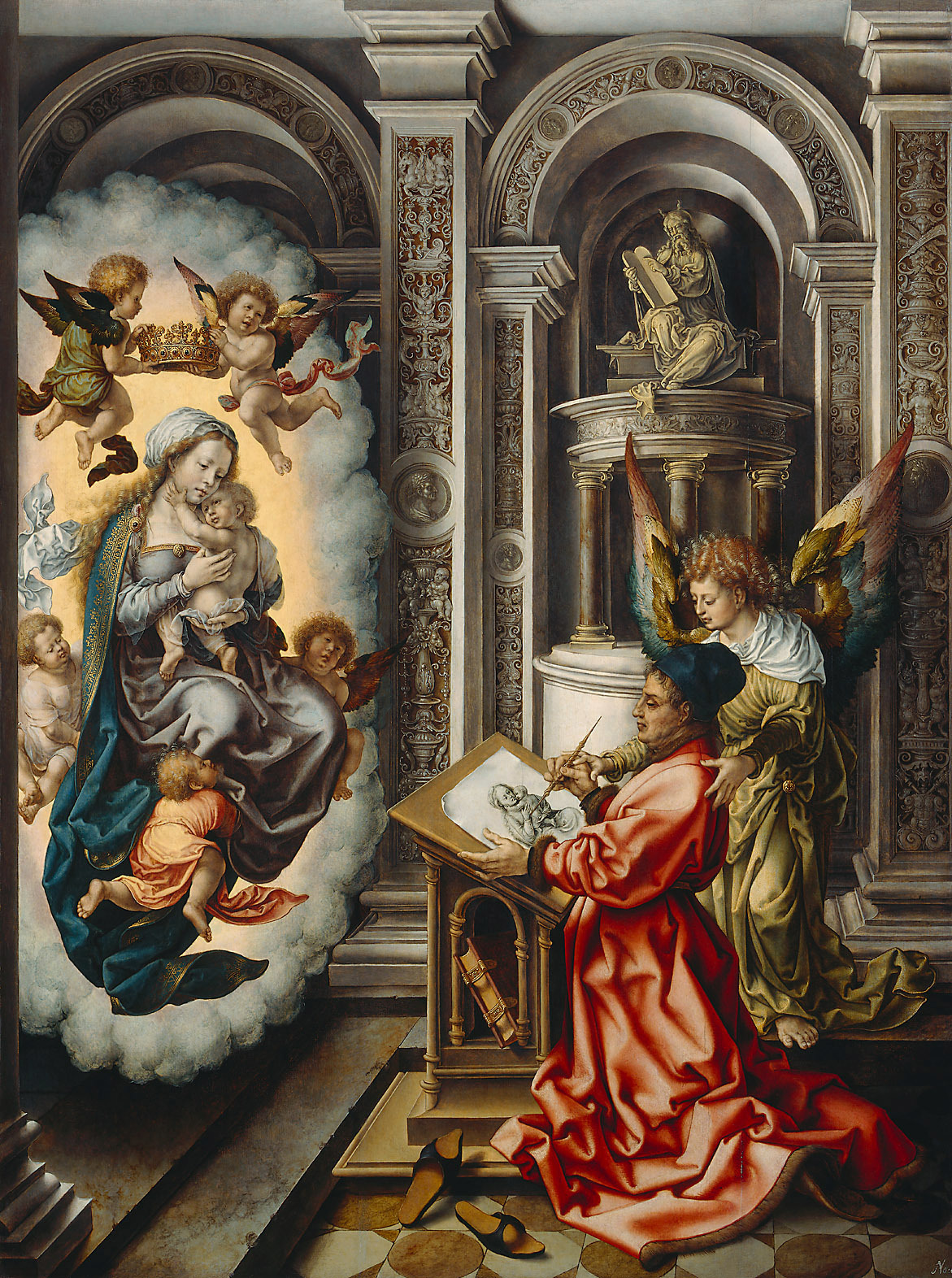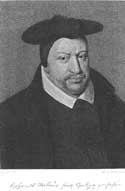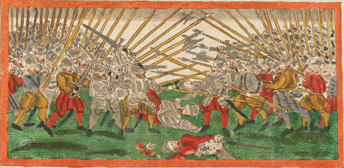|
Philippus Nutius (printer)
Philippus Nutius or Philips Nuyts (1543—1586) was a printer-bookseller in 16th-century Antwerp. Life Philippus was the son of the printer Martinus Nutius I (1515—1558) and Marie Borrewater. He was licensed as a printer on 15 September 1564 and took over the family business from his mother, "Widow of Martinus Nutius". Max Rooses, "Nutius (Philippe)", '' Biographie Nationale de Belgique''vol. 16(Brussels, 1901), 12-13. When licensed in 1570 under more stringent laws, he declared that he could not himself operate a printing press, but managed the affairs of the printing house and bookshop in the manner he had learned from his father. He knew Latin, French, Spanish, Dutch and Italian, and a little German. In 1574 he was admitted a master of the Guild of St Luke. He was married to Claire Manteaux. From 1579 his younger brother Martinus II was associated with him in the business. Philippus died in 1586 and was buried on 27 March. Publications * ''Den bibel inhoudende het Oudt ende ... [...More Info...] [...Related Items...] OR: [Wikipedia] [Google] [Baidu] |
Martinus Nutius
Martinus Nutius or Martin Nuyts was the name of three successive printer-booksellers in 16th and 17th-century Antwerp. Collectively, they were active from 1540 to 1638. Martinus Nutius I Martinus Nutius Meranus (1515—1558) was born at Meer, near Hoogstraten, and sometimes went by the name Vermeere ("of Meer"). He became a burgher of Antwerp on 31 December 1544, having been a member of Antwerp's Guild of St Luke since 1540.Max Rooses, "Nutius (Martin)", ''Biographie Nationale de Belgique''vol. 16(Brussels, 1901), 11-12. In 1541 his address was ''In Sint Jacob, naest die Gulden panne, op die pleijne van de Iseren waghe''. In 1543 he was ''buyten die Camerpoorte in den Gulden Eenhoren'', in 1544, at the sign of the Fox, and from 1546, ''in de twee Oeyvaerts'' (the two storks) on the Corte Camerstraet. His printer's mark became two storks, one carrying a fish or an eel to the other (a needle replaced the fish or eel from 1552). His motto was ''Pietas homini tutissima virtus'' (''Pie ... [...More Info...] [...Related Items...] OR: [Wikipedia] [Google] [Baidu] |
Max Rooses
Max Rooses (10 February 1839 – 15 July 1914) was a Belgian writer, literary critic, and curator of the Plantin-Moretus Museum at Antwerp. Rooses was born in Antwerp, and went to school there up to 1858, after which he attended the University of Liège to study Philosophy and Literature. From 1860 until 1864 he was study master at the ''Koninklijk Athenaeum'' (Royal Athenaeum) in Antwerp, and in the meantime he graduated with a degree in Literature from the University of Liège. In 1864, he became teacher of Dutch at the Royal Athenaeum of Namur, and in 1866 in Ghent. Finally on 8 July 1876 he was appointed Director of the Plantin-Moretus Museum in Antwerp. Bibliography * ''Geschiedenis der Antwerpsche schildersschole'' (1873) – a history of the Antwerp school of painting * ''Levensschets van Jan Frans Willems'' (1874) – a biography of Jan Frans Willems * ''Schetsenboek'' (1877) – sketchbook * ''Over de Alpen'' (1880) * ''Christophe Plantin'' (1882) * ''Correspondance de Ch ... [...More Info...] [...Related Items...] OR: [Wikipedia] [Google] [Baidu] |
Biographie Nationale De Belgique
The ''Biographie nationale de Belgique'' ( French; "National Biography of Belgium") is a biographical dictionary of Belgium. It was published by the Royal Academy of Belgium in 44 volumes between 1866 and 1986. A continuation series, entitled the ''Nouvelle Biographie Nationale'' ("New National Biography"), has been published by the Royal Academy of Science, Letters and Fine Arts of Belgium since 1988. Both the ''Biographie nationale'' and ''Nouvelle biographie nationale'' were digitised by the Fonds InBev-Baillet Latour and can be freely consulted at the Academy's website. A parallel biographical dictionary has been produced in Dutch since 1964, entitled the ''Nationaal Biografisch Woordenboek'' ("National Biographical Dictionary"). It places more emphasis on figures important to the history and culture of Flanders and is published by the Royal Flemish Academy of Belgium for Science and the Arts (with the co-operation of the Royal Academy of Dutch language and literature and the R ... [...More Info...] [...Related Items...] OR: [Wikipedia] [Google] [Baidu] |
Guild Of Saint Luke
The Guild of Saint Luke was the most common name for a city guild for painters and other artists in early modern Europe, especially in the Low Countries. They were named in honor of the Evangelist Luke, the patron saint of artists, who was identified by John of Damascus as having painted the Virgin's portrait. One of the most famous such organizations was founded in Antwerp. It continued to function until 1795, although by then it had lost its monopoly and therefore most of its power. In most cities, including Antwerp, the local government had given the Guild the power to regulate defined types of trade within the city. Guild membership, as a master, was therefore required for an artist to take on apprentices or to sell paintings to the public. Similar rules existed in Delft, where only members could sell paintings in the city or have a shop. The early guilds in Antwerp and Bruges, setting a model that would be followed in other cities, even had their own showroom or marke ... [...More Info...] [...Related Items...] OR: [Wikipedia] [Google] [Baidu] |
Angelo Poliziano
Agnolo (Angelo) Ambrogini (14 July 1454 – 24 September 1494), commonly known by his nickname Poliziano (; anglicized as Politian; Latin: '' Politianus''), was an Italian classical scholar and poet of the Florentine Renaissance. His scholarship was instrumental in the divergence of Renaissance (or Humanist) Latin from medieval norms and for developments in philology. His nickname, ''Poliziano'', by which he is chiefly identified to the present day, was derived from the Latin name of his birthplace, Montepulciano (''Mons Politianus''). Poliziano's works include translations of passages from Homer's ''Iliad'', an edition of the poetry of Catullus and commentaries on classical authors and literature. It was his classical scholarship that brought him the attention of the wealthy and powerful Medici family that ruled Florence. He served the Medici as a tutor to their children, and later as a close friend and political confidant. His later poetry, including ''La Giostra'', g ... [...More Info...] [...Related Items...] OR: [Wikipedia] [Google] [Baidu] |
Basil The Great
Basil of Caesarea, also called Saint Basil the Great ( grc, Ἅγιος Βασίλειος ὁ Μέγας, ''Hágios Basíleios ho Mégas''; cop, Ⲡⲓⲁⲅⲓⲟⲥ Ⲃⲁⲥⲓⲗⲓⲟⲥ; 330 – January 1 or 2, 379), was a bishop of Caesarea Mazaca in Cappadocia, Asia Minor (modern-day Turkey). He was an influential theologian who supported the Nicene Creed and opposed the heresies of the early Christian church, fighting against both Arianism and the followers of Apollinaris of Laodicea. His ability to balance his theological convictions with his political connections made Basil a powerful advocate for the Nicene position. In addition to his work as a theologian, Basil was known for his care of the poor and underprivileged. Basil established guidelines for monastic life which focus on community life, liturgical prayer, and manual labor. Together with Pachomius, he is remembered as a father of communal monasticism in Eastern Christianity. He is considered a saint by th ... [...More Info...] [...Related Items...] OR: [Wikipedia] [Google] [Baidu] |
Marco Girolamo Vida
Marco Girolamo Vida or Marcus Hieronymus Vida (1485? – September 27, 1566) was an Italian humanist, bishop and poet. Life Marco was born at Cremona, the son of the consular (patrician) Guglielmo Vida, and Leona Oscasale. He had two brothers: Giorgio, a captain in the service of Venice, and Girolamo, a canon of the cathedral chapter of Cremona. He also had three sisters: Lucia, Elena, and a third whose name is unknown. He began his studies in Cremona, under the local grammarian, Nicolò Lucari. He was then sent to Mantua, and then Bologna and Padua. It is conjectured that it was in Mantua, where the Canons Regular had a school, that Marco took the habit, perhaps around 1505. By about 1510 he had been granted several benefices: in the diocese of Cremona at Ticengo, then at Monticelli (diocese of Parma), then at Solarolo Monestirolo, where he held the office of provost, and finally at Paderno, where he held the title of archpriest. Vida joined the court of Pope Leo X and was ... [...More Info...] [...Related Items...] OR: [Wikipedia] [Google] [Baidu] |
Nicolaus Biesius
Nicolaus is a masculine given name. It is a Latin, Greek and German form of Nicholas. Nicolaus may refer to: In science: * Nicolaus Copernicus, Polish astronomer who provided the first modern formulation of a heliocentric theory of the solar system * Nicolaus Otto (1832 – 1891), German engineer In mathematics: * Nicolaus I Bernoulli, Swiss mathematician * Nicolaus II Bernoulli, Swiss mathematician * Nicolaus Rohlfs, 18th-century German mathematics teacher who wrote astronomical calendars In literature: * Nicolaus Becker, German lawyer and writer, the author of the ''Rheinlied'' * Nicolaus of Damascus, Greek historical and philosophical writer who lived in the Augustan age In music: * Nicolaus Bruhns, German composer * Nicolaus Zacharie, Italian composer of the early Renaissance In Christianity: * Nicolaus Ludwig Zinzendorf, German religious and social reformer and bishop of the Moravian Church * Nicolaus Taurellus, German philosopher and theologian * Nicolaus of ... [...More Info...] [...Related Items...] OR: [Wikipedia] [Google] [Baidu] |
Digest (Roman Law)
The ''Digest'', also known as the Pandects ( la, Digesta seu Pandectae, adapted from grc, πανδέκτης , "all-containing"), is a name given to a compendium or digest of juristic writings on Roman law compiled by order of the Byzantine emperor Justinian I in 530–533 AD. It is divided into 50 books. The ''Digest'' was part of a reduction and codification of all Roman laws up to that time, which later came to be known as the (). The other two parts were a collection of statutes, the (Code), which survives in a second edition, and an introductory textbook, the Institutes; all three parts were given force of law. The set was intended to be complete, but Justinian passed further legislation, which was later collected separately as the (New Laws or, conventionally, the "Novels"). History The original ''Codex Justinianus'' was promulgated in April of 529 by the C. "Summa". This made it the only source of imperial law, and repealed all earlier codifications. However, it ... [...More Info...] [...Related Items...] OR: [Wikipedia] [Google] [Baidu] |
Joannes Molanus
Joannes Molanus (1533–1585), often cited simply as Molanus, is the Latinized name of Jan Vermeulen or Van der Meulen, an influential Counter Reformation Catholic theologian of Louvain University, where he was Professor of Theology, and Rector from 1578. Born at Lille (a city in the County of Flanders, then under Habsburg rule), he was a priest and canon of St. Peter's Church, Leuven, where he died. He wrote numerous books, several only published posthumously. He is best known for his ''De Picturis et Imaginibus Sacris, pro vero earum usu contra abusus'' ("Treatise on Sacred Images"). This was published in 1570, four years after the Iconoclastic Fury had swept through the Low Countries, and it defended the production and use of devotional images, but enforcing the restrictions of the Council of Trent, as he interpreted them, in a brutally polemical fashion, which was very influential. Five further, enlarged, editions of this appeared between 1594 and 1771, and a modern Fre ... [...More Info...] [...Related Items...] OR: [Wikipedia] [Google] [Baidu] |
1543 Births
__NOTOC__ Year 1543 ( MDXLIII) was a common year starting on Monday (link will display the full calendar) of the Julian calendar. It is one of the years sometimes referred to as an "Annus mirabilis" because of its significant publications in science, considered the start of the scientific revolution. Events January–June * February 11 – King Henry VIII of England allies with Charles V, Holy Roman Emperor, against France. * February 21 – Battle of Wayna Daga: A joint Ethiopian-Portuguese force of 8,500, under Emperor Gelawdewos of Ethiopia, defeats Imam Ahmad ibn Ibrahim al-Ghazi's army of over 14,000, ending the Ethiopian–Adal war. * March ** King Gustav Vasa's troops crush the forces of Swedish peasant rebel Nils Dacke in battle, ending the uprising. Dacke escapes, but is captured and killed in the summer. ** Consolidating Act of Welsh Union: The Parliament of England establishes counties and regularises parliamentary representation in Wales. * April &nd ... [...More Info...] [...Related Items...] OR: [Wikipedia] [Google] [Baidu] |
1586 Deaths
Events * January 18 – The 7.9 1586 Tenshō earthquake, Tenshō earthquake strikes the Chubu region of Japan, triggering a tsunami and causing at least 8,000 deaths. * June 16 – The deposed and imprisoned Mary, Queen of Scots, recognizes Philip II of Spain as her heir. * July 6 – The Treaty of Berwick (1586), Treaty of Berwick is signed between Queen Elizabeth I of England and King James VI of Scotland. * July 21 – English explorer Thomas Cavendish begins the first deliberately planned Thomas Cavendish's circumnavigation, circumnavigation of the globe. * September 20–September 21, 21 – Execution of the Babington Plotters: The 14 men convicted of a plot (uncovered on July 17) to murder Queen Elizabeth and replace her with Mary, Queen of Scots, are hanged, drawn and quartered (the first seven being disembowelled before death) in St Giles Field, London. * September 22 – Battle of Zutphen: Spanish troops defeat the Dutch rebels and their Eng ... [...More Info...] [...Related Items...] OR: [Wikipedia] [Google] [Baidu] |




